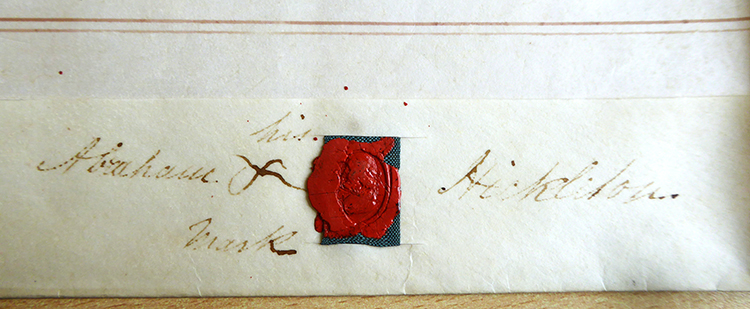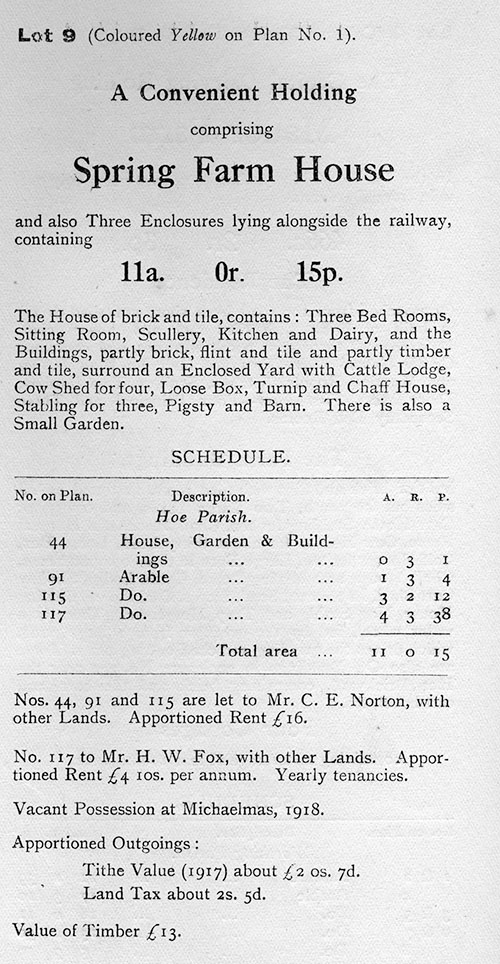|
|
| |
 Spring Farm in the 1950s. Cyril Norton
was the farmer.
 On the 1811 Enclosure map, Spring Farm is just below No. 42, marked Hickleton (tinted red). Abraham Hickleton owned it, but not the adjacent land, No. 43. If Hickleton had been using that ground, probably still part of the wider common, for his sustenance, he would have had to have rented it from then on as it was awarded to Sir John Lombe, of Great Melton, in the Enclosure. Hickleton sold the house to local farmer Richard Mitchell in 1820. Aged ninety, in 1822, Hickleton died in the 'House of Industry' – Gressenhall Workhouse. The same year Mitchell sold Spring Farrm to Sir John Lombe's estate. [Courtesy of Norfolk Record Office C/Sca/2/243]  Abraham Hickleton's mark on the indenture that records the sale to Richard Mitchell. [Courtesy of Norfolk Record Office EVL 157, 453X1]  James Fellows rented the farm from
the Lombe estate
James Fellows rented the farm from
the Lombe estate in the 1840s. The 1851 census lists James and his wife Mary, as well as their four children, Christopher, 21, Dorcas, 19, Leonard, 16, and Alfred, 12.  James Fellows had to pay the Rector
1s 6d in tithes in 1848.
[Courtesy of Norfolk Record Office BR 276/1/119]  Threshing at Spring Farm. The engine is a Fowler, owned by W. H. Riches of Field House, Swanton Morley, contractor. The engine driver is Dan Barnard. Samuel Norton leased the farm in 1900, by 1911 it appears in his son Cyril's name.  The same engine in about 1895. Theophilus (Dick) Barker, the uncle of Margaret Butterfield, on the left.  James Blazy was the tenant farmer at the time of the 1871 census.  In 1917 when the whole Bylaugh estate was sold, Cyril Norton, then the tenant, bought Spring Farm with eleven acres for £210. His father Samuel had also been the tenant. Lucy Norton's album,1920s/30s
Lucy Norton (née Barker) married Fred Butterfield (see 8 & 9 Hoe page) and when widowed, married Cyril Norton. Her daughter Mabel Butterfield passed the photograph album on to her own daughter, Mary Hubbard who kindly lent it to the archive to be copied.  Lucy Norton and her daughter Mabel Butterfield.  Cyril and Lucy Norton with their turkeys.
Cyril and Lucy Norton with their turkeys. According to Dr Eric Puddy, in his history of Gressenhall Mill, The Watermill of the Chappell of St Nicholas of Rougholme in Gressenhall, otherwise known as Chapel Mill, published some time after Cyril Norton's death in 1960, aged 88, Norton went to work at the mill aged 14, later serving his apprenticeship at Hovis in London before returning to work at Chapel Mill.  Mabel feeding the hens and ducks by the barn. Stackyard in the background.  Mabel Butterfield  Reaper binder – a new-fangled contraption?  Harvest.
Lucy Norton doing the 'howgee'
boy's job. Harvest.
Lucy Norton doing the 'howgee'
boy's job. Feeding the turkeys.  Lucy Norton
had a pet pig. Lucy Norton
had a pet pig. Tea in the back yard.  The wedding of Mabel Butterfield, 1938. Cyril and Lucy Norton are at the back, right.  Spring Farm was built about 1800, probably on common land. The Helwys estate map dated 1775 (on the Village page) shows common land extending as far south as the east-west road through the village, now Hall Road, including the area where Spring Farm stands. Originally, it was likely to have been one-up, one-down with a lean-to on the back. The front door was where the left-hand ground floor window is now, and opened straight into the main downstairs room, which had a range in the fireplace. Later extensions included the laundry (behind the 1960s conservatory), its chimney is visible in the 1950s photo beginning this page, and a dairy on the north side. A first floor extension required alterations to the roof which are still visible inside. It may have acquired its dramatic chimneys in the 1870s when it belonged to the Bylaugh estate. The Norfolk architect Thomas Jeckyll was employed to remodel farms on the estate. The chimneys and window frames are typical of the designs Jeckyll specified for the larger farmhouses like Manor Farm, Hoe and Field House, Swanton Morley. Estate agent's photograph, 1977. Sue and Dick Malt bought the house from Margaret (Peggy) Butterfield. Spring Farm Barn  Spring Farm barn before conversion, 1977. The corrugated iron fence enclosed a cattle yard and sheds. Opposite was a four-bay cart shed.  The Stroulger family moving into the Barn, 1984.
The Stroulger family moving into the Barn, 1984. Harry Malt helping Leila unload essential items.  Philip
Stroulger checking his bees, 1991. Philip
Stroulger checking his bees, 1991. |